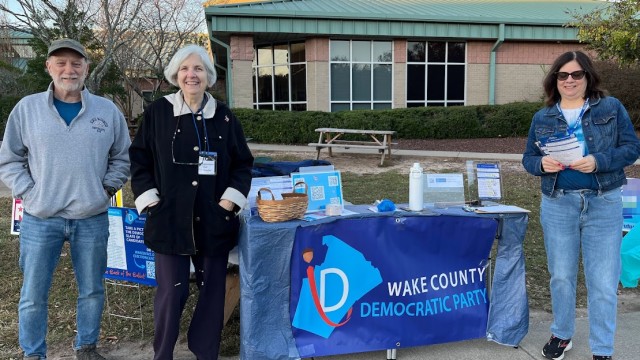WCDP Election Central – Candidate Information
Sarah Taber
NC Commissioner of Agriculture

Candidate Statement:
Dr. Sarah Taber’s roots in agriculture run deep. Born to a military family with roots in Harlan County, KY, she helped operate her family’s small holdings and took field, garment shop, and factory jobs to pay for school.
Alongside her work with family farms, Sarah helped launch a series of vegetable greenhouses and indoor farms that are now worth over $4 billion. This experience taught her how to bring new people and perspectives into agriculture. Failure is common in the highly competitive greenhouse sector – but all of Sarah’s clients are still in operation, including those who began with little or no experience in agriculture. All too often, our leaders treat the loss of farms and farmers as inevitable. But it’s not!
Dr. Sarah Taber is an agricultural leader with a track record of growing new farm businesses and bringing new people into farming. She is honored to be the North Carolina Democratic Party’s nominee for Commissioner of Agriculture, making her one of two Democrats in the country running for Commissioner of Agriculture this year. Sarah is raising her family in Fayetteville, where her husband Rob teaches at Fayetteville State University.
Importance of this Race:
Sarah Taber is running to help our rural communities thrive and grow by rooting out corruption in our agriculture sector, responding more dynamically to market forces that could significantly increase farm revenues, and making sure that we have a working countryside that works for everyone. She is an agricultural leader with a proven track record, and she wants to see NC farmers thrive.
Office Responsibilities:
- The Commissioner of Agriculture is in charge of the NC Department of Agriculture and Consumer Services, consisting of 20 divisions and more than 2,000 employees.
- The commissioner’s primary goal is protecting, maintaining, and enhancing the ability of agriculture to produce an adequate supply of food and fiber and enforcing regulations to that effect.
- She is also responsible for addressing agricultural environmental issues, including soil and water conservation.
Issues:
What We Grow:
North Carolina is ideal for high-value crops like berries, tree nuts, pumpkins, orchard fruit and more. These crops can bring 10-100x more revenue than North Carolina’s current standbys like corn, soy, and tobacco.
California and Florida are the traditional powerhouses for fruit and vegetables, but they can’t satisfy demand due to limited space and water. This opens a multi-billion-dollar opportunity for rural NC. Hemp and cannabis are also key opportunities for our state. Higher revenues will bring more income and jobs here, and stop farms from closing and being lost to real estate development.
Who Makes a Living in Agriculture:
We need on-ramps for new people to become farmers. and we need fair funding for Black and other marginalized farmers, who are on the leading edge of farm loss in North Carolina.
Strong farm economies also need facilities to turn high-value crops into foods like nut butters, sauces, frozen vegetables, and more. Both farms and food plants need skilled workers- and those workers need a living wage or they’ll take their skills elsewhere.
How We Do Business:
As we invest in rural North Carolina, we should make sure investments provide on-ramps to ownership. This keeps revenue in the state and anchors rural communities. We already have models: Mt. Olive Pickle Company has run a profit-sharing plan for its employees since 1943. This has allowed residents of Mt. Olive to build their own wealth, rather than just export it somewhere else. Profit-sharing, ESOPs, cooperatives, and other on-ramps to ownership are tax-advantaged, proven to increase profitability, and are a common-sense tool to strengthen rural economies.




